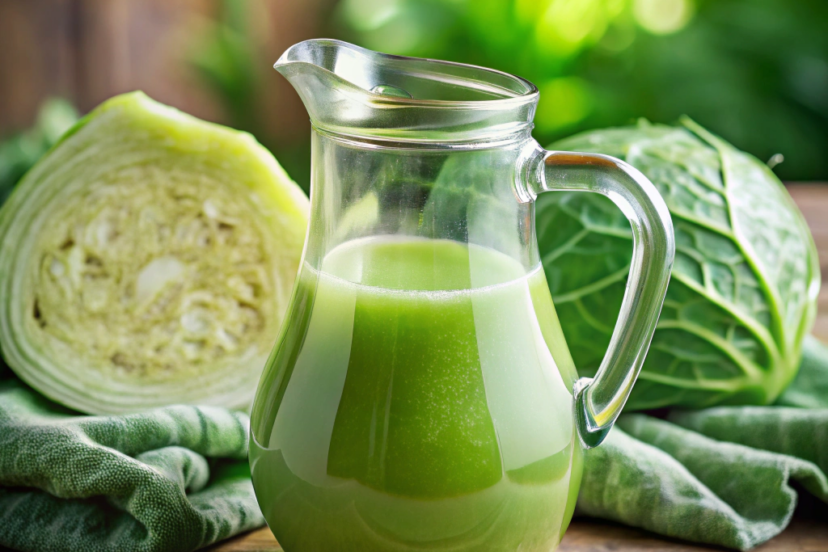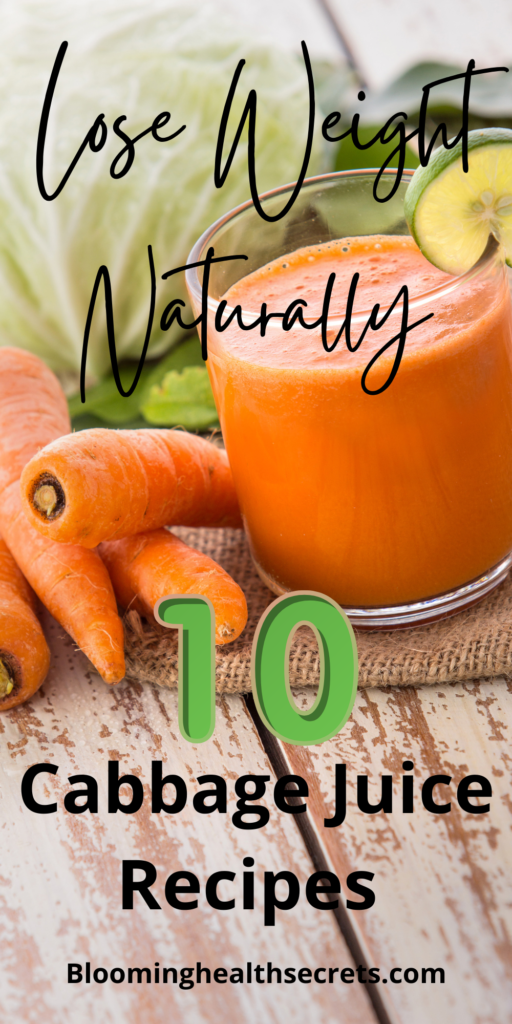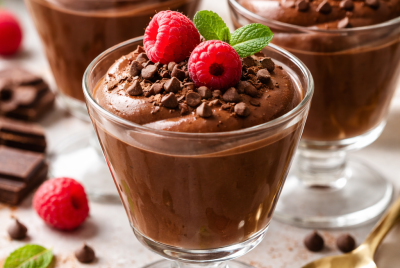Cabbage Juice: Benefits + 10 Recipes for Weight Loss
If you’re on the lookout for a natural, nutrient-packed, and cheap way to boost your health and support weight loss, cabbage juice is a fantastic option to consider. It might not sound like the most glamorous of beverages, but trust me, this humble juice packs a serious punch when it comes to health benefits. Loaded with vitamin C, vitamin K, antioxidants, and anti-inflammatory compounds, cabbage juice offers a wide range of benefits—from improving digestion to promoting heart health. Not only that, but it can also help with weight loss, which is why it’s becoming increasingly popular in health circles. Let’s take a deep dive into the world of cabbage juice, explore its benefits, and discover some amazing recipes you can try at home!
What is Cabbage Juice?
Cabbage juice is simply the liquid extracted from fresh raw cabbage, typically made using a juicer or blender. You can use both green cabbage and red cabbage to make cabbage juice, and both varieties are rich in vitamins, minerals, and bioactive compounds that contribute to various health benefits. If you’re familiar with vegetable juices, you know they can be a great way to consume multiple nutrients at once—and cabbage juice is no exception. It’s easy to make, versatile, and offers benefits that make it a true wellness superstar.
Why Cabbage Juice for Weight Loss?
So, why should you consider adding cabbage juice to your weight loss plan? First of all, cabbage juice is incredibly low in calories but high in nutrients and fiber. This makes it a great addition to any weight-loss regimen since it can help you feel fuller for longer, curb cravings, and promote regular bowel movements. Unlike sugary drinks that pack on the pounds, cabbage juice is refreshing, hydrating, and nutrient-dense.
In addition to being low in calories, cabbage juice contains compounds that may support fat metabolism. It’s high in fiber, which aids digestion and helps maintain a healthy digestive system, and it’s also loaded with water, helping to keep you hydrated without unnecessary calories. Furthermore, the antioxidants and anti-inflammatory properties in cabbage juice may help reduce chronic inflammation—a condition often linked to weight gain.
Also read : How To Get Rid Of Upper Belly Fat: Your Comprehensive Guide
Health Benefits of Cabbage Juice
Rich in Vitamin C
We all know that vitamin C is an essential nutrient, and cabbage juice delivers it in abundance. Vitamin C is a potent antioxidant that fights free radicals in the body, reducing oxidative stress and helping to prevent cell damage. It’s also great for skin health, supports the immune system, and plays a role in collagen production—essential for healthy skin, hair, and nails.
Vitamin K for Bone Health
Cabbage juice is packed with vitamin K, which is essential for bone health and blood clotting. Vitamin K works with calcium to strengthen bones and may reduce the risk of fractures. Additionally, it plays an important role in ensuring your blood clots properly, making it a nutrient you want to include in your diet regularly.
Improves Heart Health
Cabbage juice may help to support a healthy heart. Its combination of bioactive compounds, vitamin C, and vitamin K promotes heart health by reducing inflammation and supporting the body’s natural processes. It’s also believed that the antioxidants in cabbage juice can help lower blood pressure, which is vital for those at risk of developing heart disease.
Supports Digestive Health
One of the major benefits of cabbage juice is its ability to improve digestive health. It’s high in fiber, which aids in digestion and promotes regular bowel movements. Drinking cabbage juice can also support your gut microbiota—the beneficial bacteria in your digestive tract that play a crucial role in overall health. A balanced gut microbiome helps with digestion, reduces bloating, and can even improve mood.
Relieves Stomach Ulcers
Cabbage juice has long been touted as a natural remedy for gastric ulcers, peptic ulcers, and even stomach ulcers caused by H. pylori. Studies have found that cabbage contains a compound called vitamin U (also known as S-methylmethionine), which helps to repair the stomach lining and protect against ulcers. An older study from the 1950s found that consuming cabbage juice significantly helped heal peptic ulcers in patients in just a few weeks.
Anti-Inflammatory Properties
The anti-inflammatory properties of cabbage juice make it an excellent choice for reducing chronic inflammation. Inflammation is at the root of many health conditions, including heart disease, diabetes, and even cancer. The compounds in cabbage juice can help combat inflammatory responses in the body, making it a powerful ally for long-term health.
Gut Health and Ulcerative Colitis
Cabbage juice is also thought to be beneficial for people suffering from inflammatory bowel disease (IBD), including ulcerative colitis and irritable bowel syndrome (IBS). Studies have suggested that drinking cabbage juice can help reduce inflammation in the digestive tract, promote a healthy gut environment, and alleviate symptoms related to these conditions.
Cancer Prevention
Cabbage juice contains compounds like glucosinolates which are sulfur-containing chemicals believed to have cancer-fighting properties. These compounds break down during digestion to form substances that have been found to prevent the growth of cancer cells in animal studies. Although more research is needed, these findings are promising for those looking to lower their cancer risk through diet.
Potential Side Effects of Cabbage Juice
As with most things in life, moderation is key when it comes to consuming cabbage juice. While it offers numerous benefits, there are some negative side effects you should be aware of, especially if you drink it in excess.
- Digestive Discomfort:
Due to its high fiber content, cabbage juice can cause gas and bloating in some people. Start with small amounts and gradually increase your intake to see how your body reacts. - Blood Thinners:
If you’re on blood thinners, be cautious with cabbage juice as it contains vitamin K, which can interfere with your medication. - Irritation of Digestive System:
People with peptic ulcers, stomach ulcers, or gastric ulcers should consult a doctor before consuming cabbage juice in large amounts. While cabbage juice may help heal ulcers, consuming too much raw juice could potentially irritate the stomach lining.
10 Cabbage Juice Recipes for Weight Loss
Let’s get to the fun part—making your own cabbage juice! Here are 10 easy-to-make cabbage juice recipes that can help with weight loss while delivering a punch of nutrients.
1. Classic Green Cabbage Juice
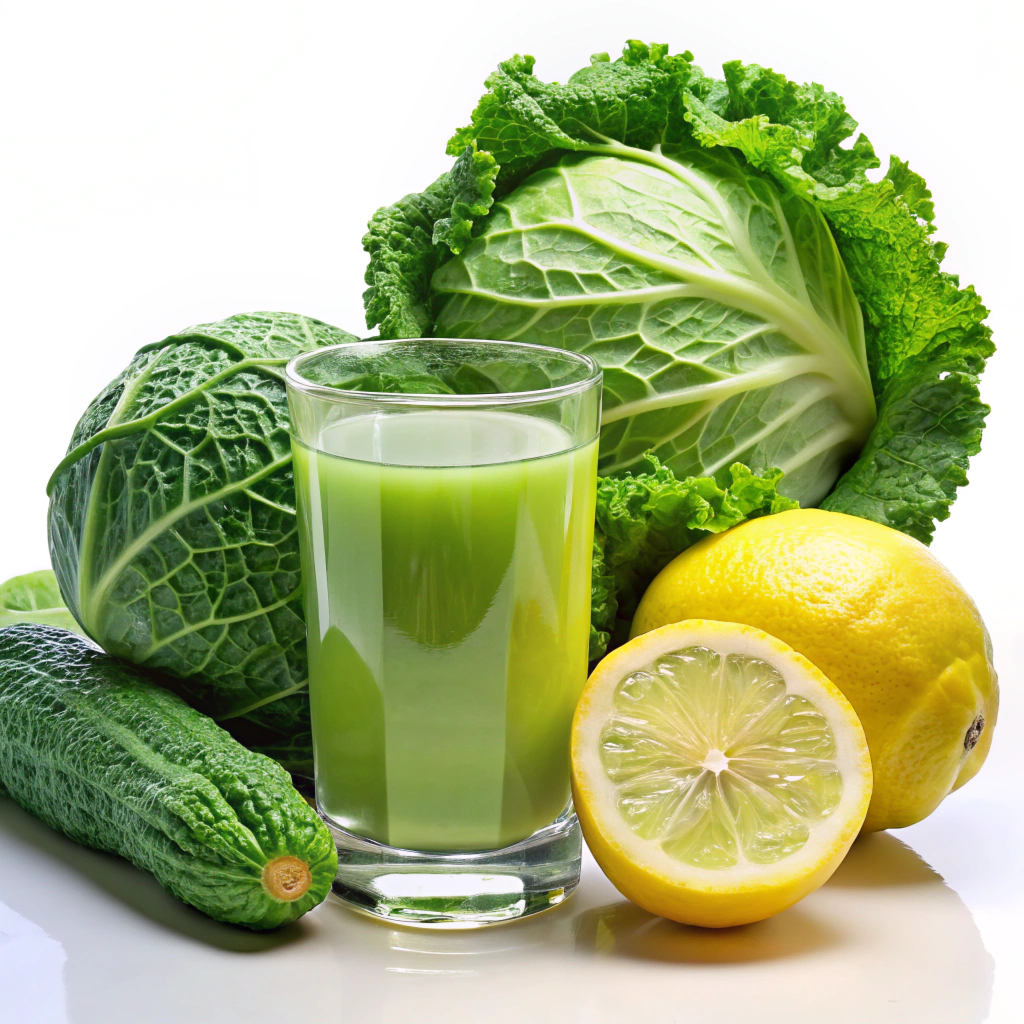
This juice is hydrating and great for promoting gut health.
Ingredients:
- 1/2 green cabbage
- 1 cucumber
- Juice of 1 lemon
- 1 cup water
Method:
Juice the ingredients using a cold press juicer or blender. Strain using a fine mesh strainer.
Nutritional Content (Per Glass):
- Calories: 50 kcal (2.5% DV)
- Carbohydrates: 11 g (4% DV)
- Protein: 2 g (4% DV)
- Fiber: 4 g (16% DV)
- Vitamin C: 70 mg (78% DV)
- Vitamin K: 90 mcg (75% DV)
- Folate: 40 mcg (10% DV)
- Potassium: 300 mg (6% DV)
- Calcium: 70 mg (7% DV)
Number of Glasses: 2
Storage: Excess juice can be stored in the fridge for up to 24 hours in an airtight container. Shake well before drinking.
________________________________________
2. Cabbage and Celery Juice
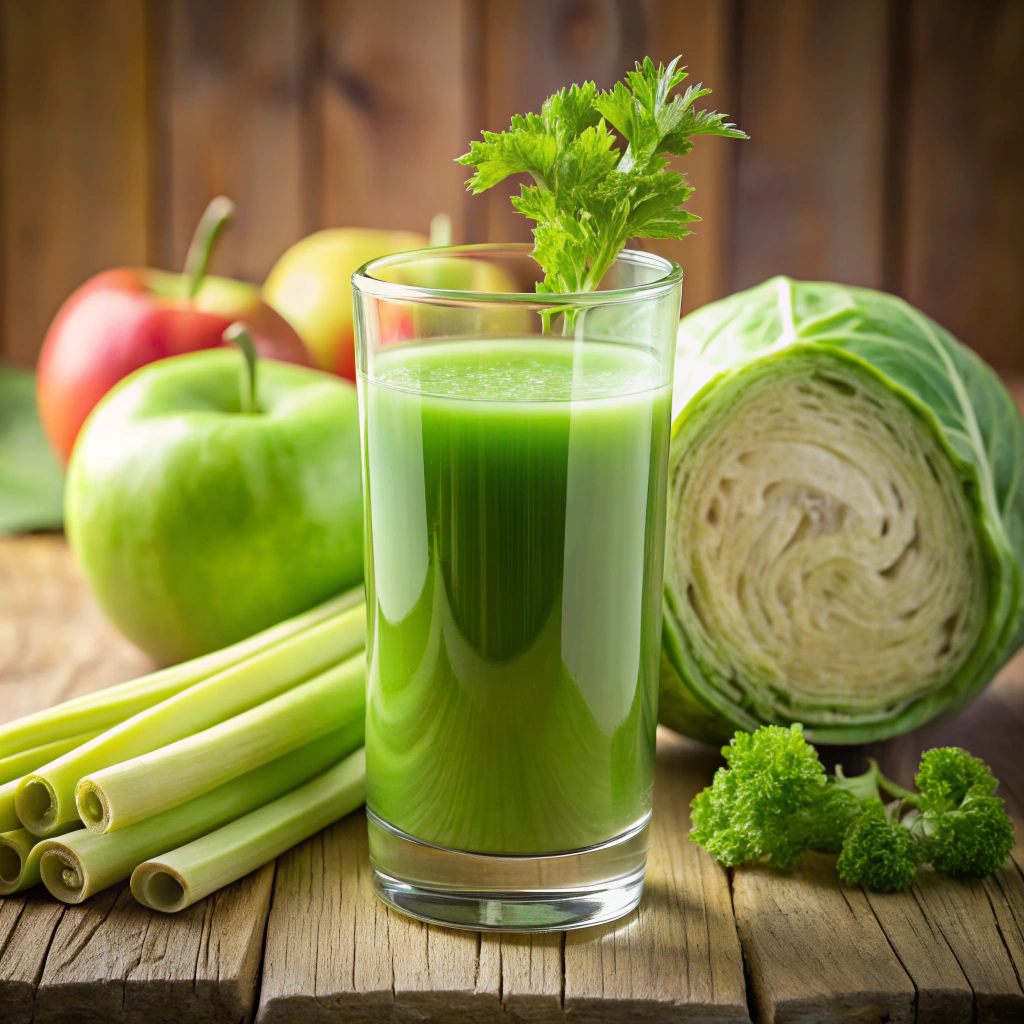
A refreshing detox juice that supports heart health and weight loss.
Ingredients:
- 1/2 green cabbage
- 3 celery stalks
- 1 green apple
- 1/2 cup water
Method:
Juice all ingredients and strain if needed.
Nutritional Content (Per Glass):
- Calories: 55 kcal (2.8% DV)
- Carbohydrates: 12 g (4% DV)
- Protein: 1 g (2% DV)
- Fiber: 3 g (12% DV)
- Vitamin C: 60 mg (67% DV)
- Vitamin K: 110 mcg (92% DV)
- Potassium: 350 mg (7% DV)
- Calcium: 60 mg (6% DV)
Number of Glasses: 2
Storage: Store in the refrigerator for up to 48 hours. Shake well before drinking.
________________________________________
3. Red Cabbage and Apple Juice
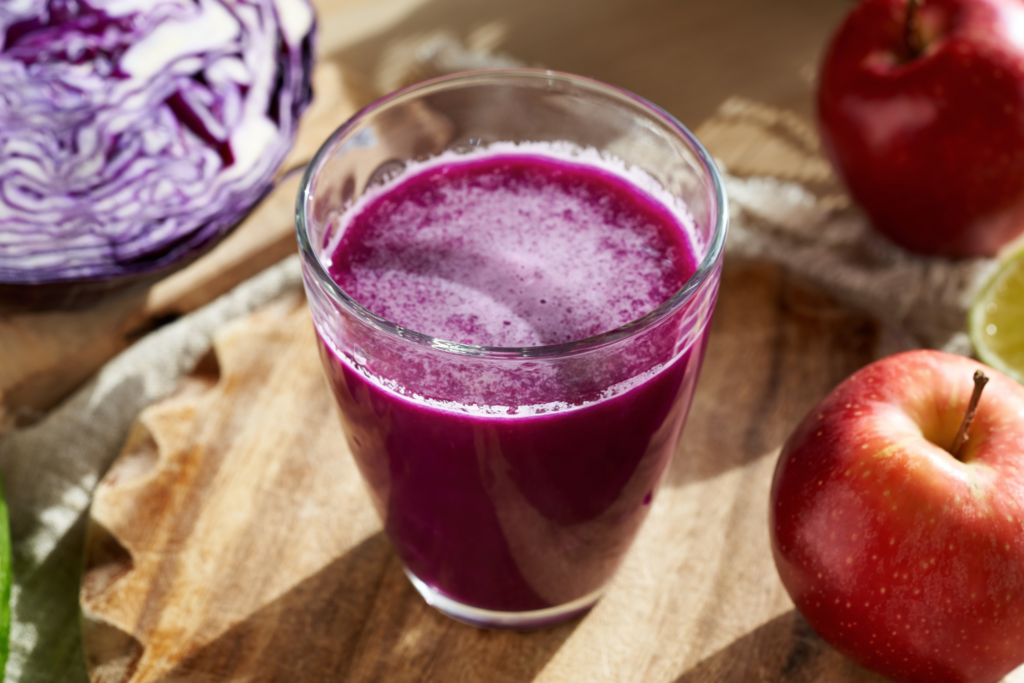
This juice is packed with antioxidants, great for improving skin health.
Ingredients:
- 1/2 red cabbage
- 2 apples
- 1 small piece of ginger
- 1/2 cup water
Method:
Juice all ingredients and strain if necessary.
Nutritional Content (Per Glass):
- Calories: 90 kcal (4.5% DV)
- Carbohydrates: 22 g (8% DV)
- Protein: 1 g (2% DV)
- Fiber: 3 g (12% DV)
- Vitamin C: 80 mg (89% DV)
- Vitamin K: 120 mcg (100% DV)
- Potassium: 320 mg (6% DV)
- Calcium: 70 mg (7% DV)
Number of Glasses: 3
Storage: Can be stored for 24-48 hours in an airtight container. Best consumed fresh.
________________________________________
4. Purple Cabbage and Beet Juice
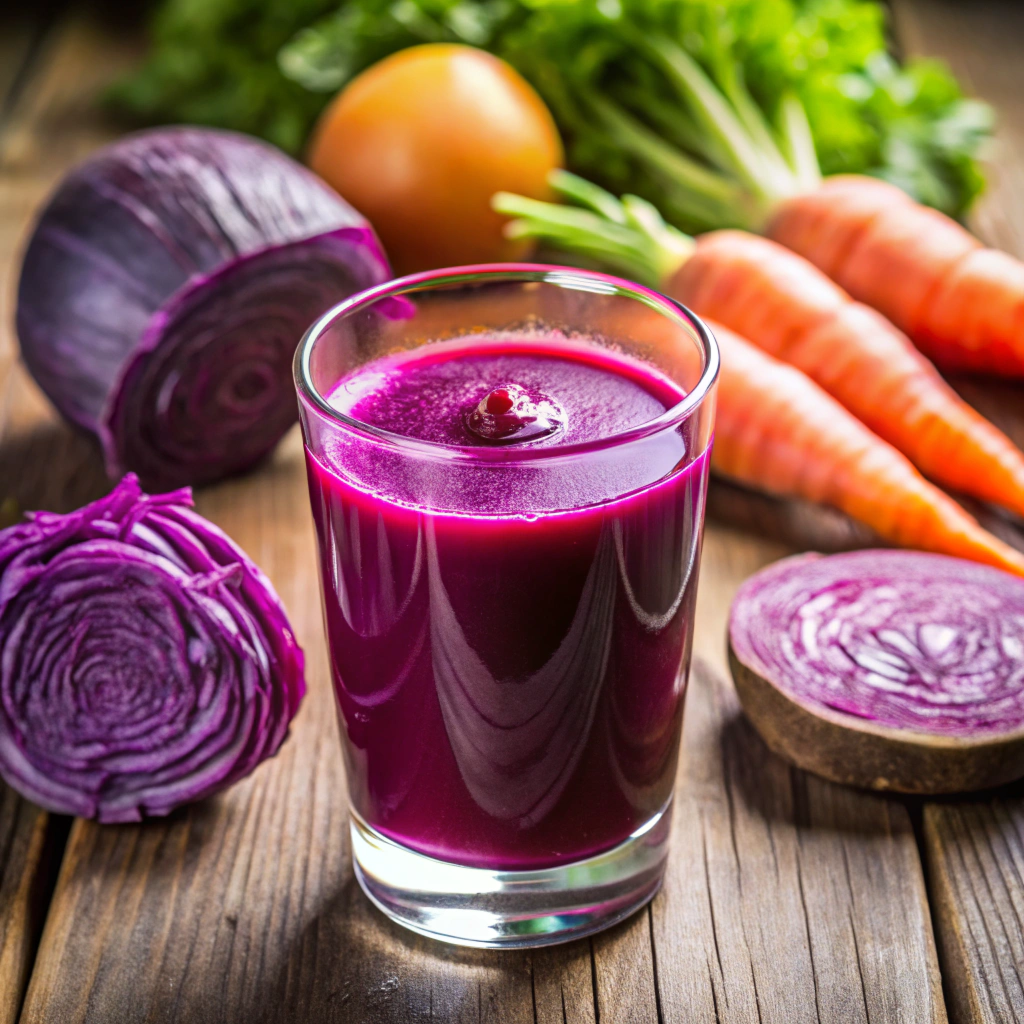
This vibrant juice helps improve circulation and supports heart health.
Ingredients:
- 1/2 purple cabbage
- 1 small beetroot
- 1 carrot
- 1/2 cup water
Method:
Juice and strain to remove pulp.
Nutritional Content (Per Glass):
- Calories: 80 kcal (4% DV)
- Carbohydrates: 18 g (6% DV)
- Protein: 2 g (4% DV)
- Fiber: 4 g (16% DV)
- Vitamin C: 70 mg (78% DV)
- Vitamin K: 130 mcg (108% DV)
- Potassium: 400 mg (9% DV)
- Calcium: 80 mg (8% DV)
Number of Glasses: 2
Storage: Store the excess juice for up to 48 hours in a sealed container in the fridge.
________________________________________
5. Cabbage, Pineapple, and Mint Juice
This tropical juice is perfect for boosting the immune system and aiding digestion.
Ingredients:
- 1/2 green cabbage
- 1/4 pineapple
- A handful of mint leaves
- 1 cup water
Method:
Juice all the ingredients and strain.
Nutritional Content (Per Glass):
- Calories: 90 kcal (4.5% DV)
- Carbohydrates: 20 g (7% DV)
- Protein: 1 g (2% DV)
- Fiber: 3 g (12% DV)
- Vitamin C: 100 mg (111% DV)
- Vitamin K: 95 mcg (79% DV)
- Potassium: 280 mg (6% DV)
- Calcium: 60 mg (6% DV)
Number of Glasses: 2
Storage: Store the leftover juice in the refrigerator for up to 48 hours. Stir well before serving.
________________________________________
6. Cabbage and Carrot Juice
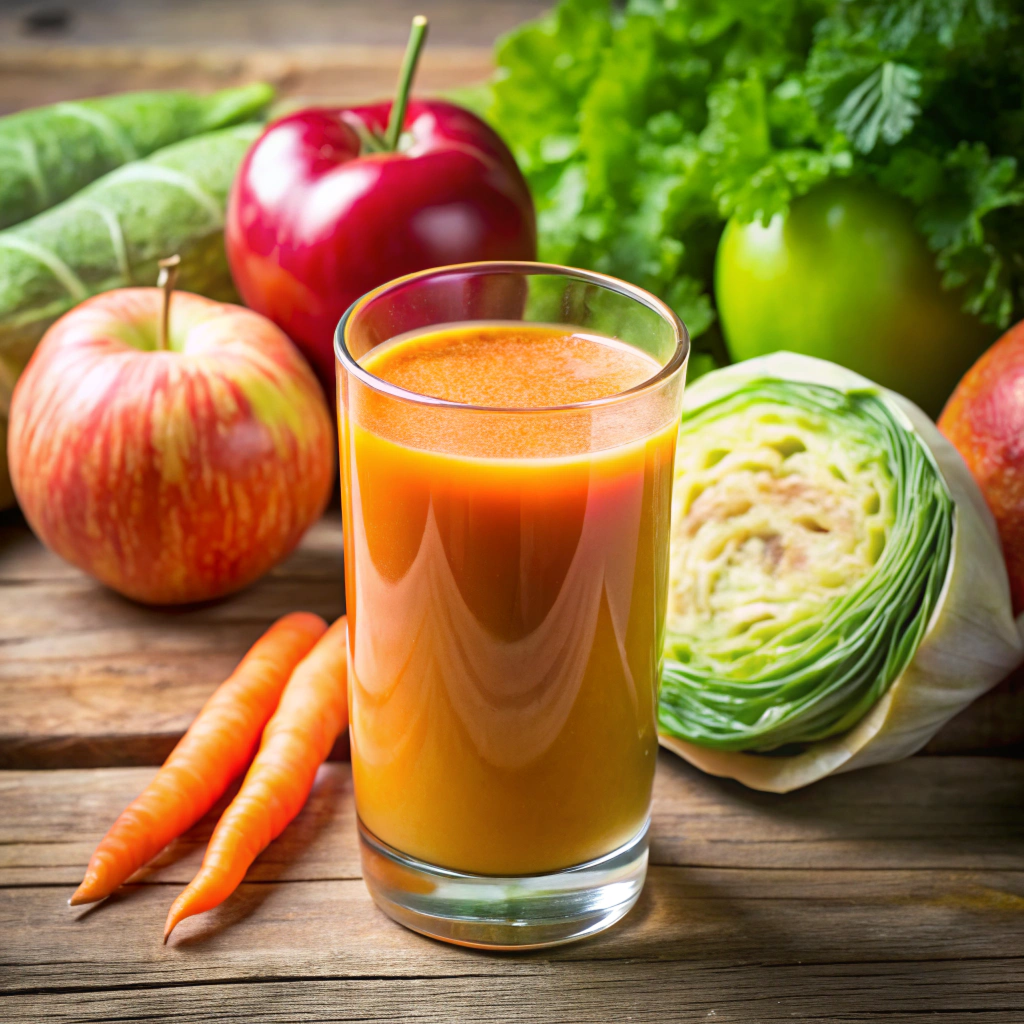
A colorful juice rich in antioxidants that promotes healthy skin and vision.
Ingredients:
- 1/2 green cabbage
- 2 carrots
- 1 apple
- 1/2 cup water
Method:
Juice the ingredients and strain if needed.
Nutritional Content (Per Glass):
- Calories: 70 kcal (3.5% DV)
- Carbohydrates: 16 g (6% DV)
- Protein: 1 g (2% DV)
- Fiber: 3 g (12% DV)
- Vitamin C: 55 mg (61% DV)
- Vitamin K: 110 mcg (92% DV)
- Potassium: 300 mg (6% DV)
- Calcium: 60 mg (6% DV)
Number of Glasses: 2
Storage: Can be stored for up to 48 hours in a sealed container in the fridge. Shake before drinking.
________________________________________
7. Cabbage and Lemon Detox Juice
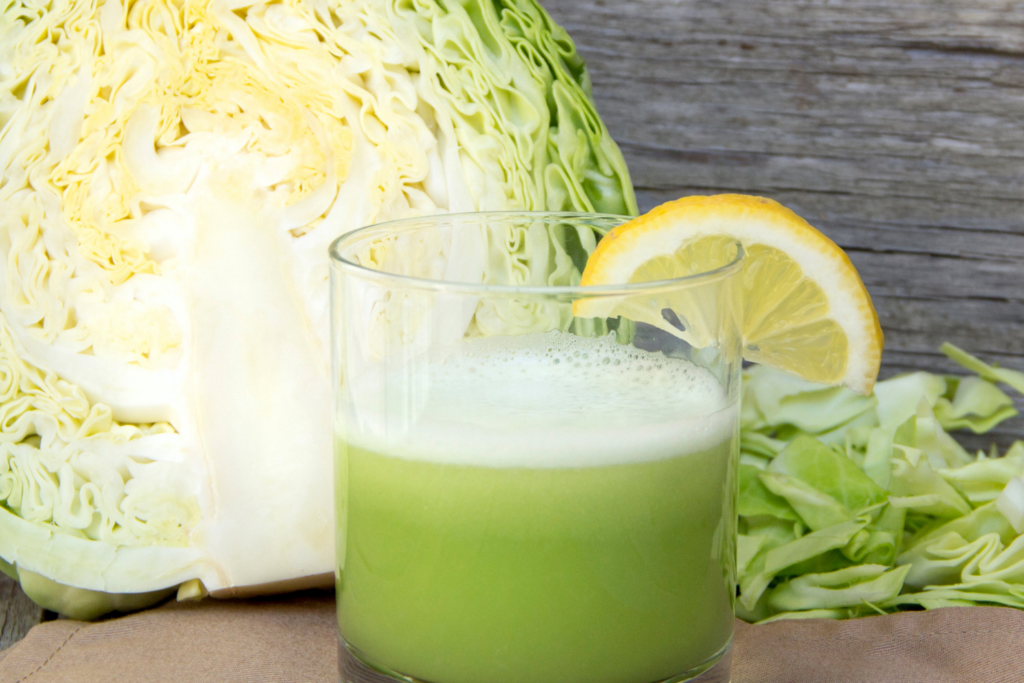
A refreshing juice that detoxifies and provides a good source of vitamin C.
Ingredients:
- 1/2 green cabbage
- Juice of 2 lemons
- 1 cucumber
- 1/2 cup water
Method:
Juice and strain to remove pulp.
Nutritional Content (Per Glass):
- Calories: 45 kcal (2% DV)
- Carbohydrates: 10 g (3% DV)
- Protein: 1 g (2% DV)
- Fiber: 3 g (12% DV)
- Vitamin C: 75 mg (83% DV)
- Vitamin K: 105 mcg (88% DV)
- Potassium: 260 mg (6% DV)
- Calcium: 60 mg (6% DV)
Number of Glasses: 2
Storage: Best consumed fresh, but can be stored for up to 24 hours in the fridge.
________________________________________
8. Cabbage, Orange, and Spinach Juice
A vitamin-packed juice to enhance immune function and provide antioxidants.
Ingredients:
- 1/2 green cabbage
- 2 oranges
- A handful of spinach
- 1/2 cup water
Method:
Juice all ingredients and strain.
Nutritional Content (Per Glass):
- Calories: 80 kcal (4% DV)
- Carbohydrates: 19 g (7% DV)
- Protein: 2 g (4% DV)
- Fiber: 3 g (12% DV)
- Vitamin C: 100 mg (111% DV)
- Vitamin K: 130 mcg (108% DV)
- Potassium: 350 mg (7% DV)
- Calcium: 80 mg (8% DV)
Number of Glasses: 2
Storage: Store in the refrigerator for 24-48 hours in an airtight container.
________________________________________
9. Cabbage and Grapefruit Juice
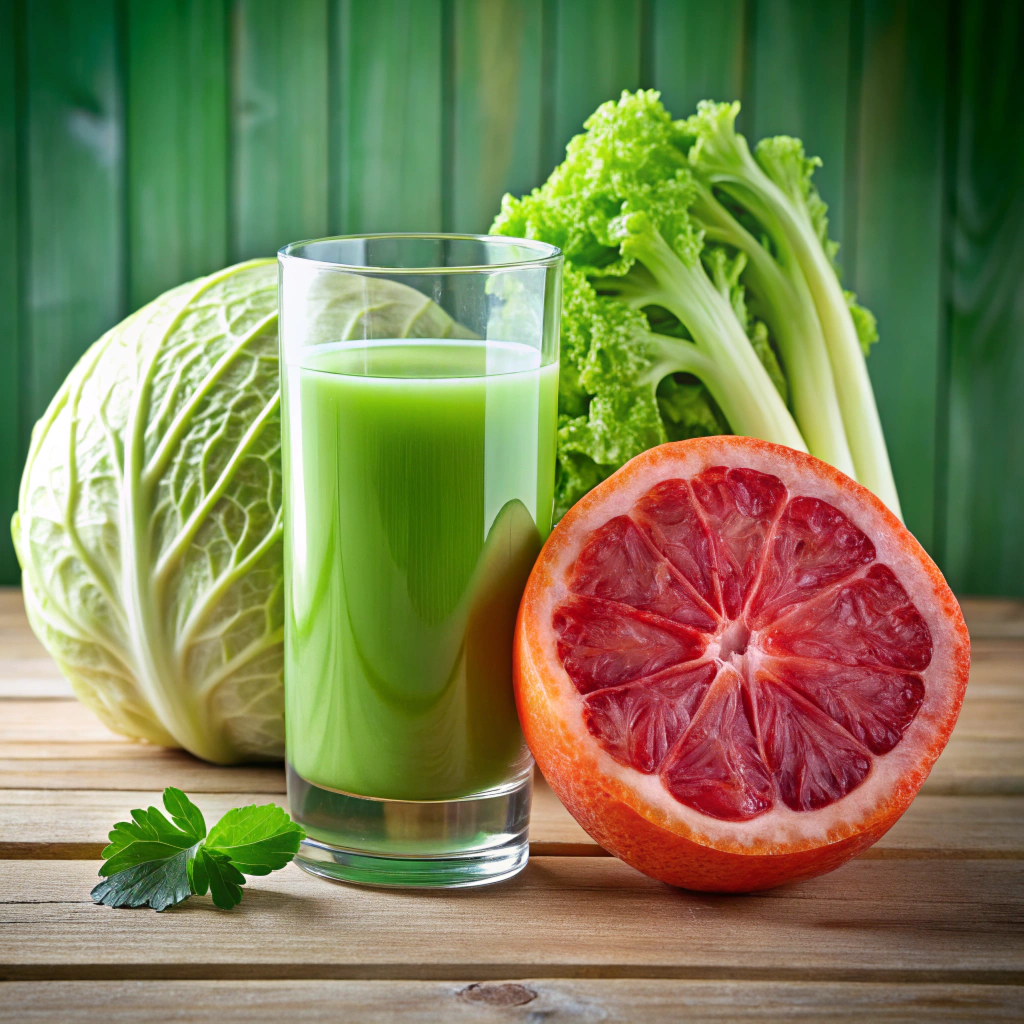
This juice is excellent for weight loss and detoxification.
Ingredients:
- 1/2 green cabbage
- 1 grapefruit
- 1 celery stalk
- 1/2 cup water
Method:
Juice and strain the ingredients.
Nutritional Content (Per Glass):
- Calories: 60 kcal (3% DV)
- Carbohydrates: 15 g (5% DV)
- Protein: 1 g (2% DV)
- Fiber: 2 g (8% DV)
- Vitamin C: 80 mg (89% DV)
- Vitamin K: 105 mcg (88% DV)
- Potassium: 300 mg (6% DV)
- Calcium: 70 mg (7% DV)
Number of Glasses: 2
Storage: Best when consumed fresh, but can be kept for up to 24 hours in the fridge.
________________________________________
10. Cabbage and Pear Juice
A sweet, hydrating juice that promotes digestion and skin health.
Ingredients:
- 1/2 green cabbage
- 2 pears
- Juice of 1 lemon
- 1/2 cup water
Method:
Juice all ingredients and strain if necessary.
Nutritional Content (Per Glass):
- Calories: 85 kcal (4% DV)
- Carbohydrates: 22 g (8% DV)
- Protein: 1 g (2% DV)
- Fiber: 4 g (16% DV)
- Vitamin C: 70 mg (78% DV)
- Vitamin K: 110 mcg (92% DV)
- Potassium: 320 mg (6% DV)
- Calcium: 60 mg (6% DV)
Number of Glasses: 2
Storage: Store in the fridge for up to 24 hours in a sealed container. Stir before drinking.
General Storage Tips for Cabbage Juice
- Optimal Storage Time:
Fresh cabbage juice is best consumed within 24-48 hours to preserve nutrients. Store it in the refrigerator in an airtight container, preferably glass. - Freezing:
If you wish to store cabbage juice for longer, you can freeze it for up to 1 month. Freeze in portioned containers and thaw in the fridge overnight before consuming. - Refrigeration:
If you’re not freezing, always keep the juice chilled in the fridge and give it a good shake before drinking to redistribute the nutrients.
How Much Cabbage Juice Can Be Consumed Daily?
When it comes to cabbage juice, moderation is key. Typically, you can consume 1 to 2 glasses daily, depending on your personal tolerance, nutritional needs, and health goals.
General Recommendations:
- 1 glass per day is sufficient for most people to reap the health benefits, such as improving digestion, promoting weight loss, and boosting the immune system.
- 2 glasses daily can be helpful for individuals seeking targeted health benefits, like improving gut health or managing inflammatory conditions.
Considerations for Daily Consumption:
- Nutrient Absorption:
Cabbage juice is nutrient-dense, especially rich in vitamin C, vitamin K, and fiber. However, consuming too much can lead to nutrient imbalances, like excess vitamin K interfering with blood thinners. - Digestive Sensitivity:
Some individuals may experience digestive discomfort, like gas or bloating, due to the fiber and sulfur compounds in cabbage. - Health Conditions:
People with thyroid issues or those on blood-thinning medications should be cautious due to the goitrogenic properties of cabbage and its high vitamin K content.
Best Practice:
- Start with ½ to 1 glass per day and gradually increase based on your body’s tolerance.
- If you’re using cabbage juice therapeutically (e.g., for ulcers or weight loss), consult a healthcare provider to tailor the intake to your needs.
Remember, while cabbage juice offers many health benefits, it’s always best to enjoy it as part of a balanced diet.
A Small Personal Story
My friend Nandini used to suffer from gastritis. She’s tried different tablets, but they always yielded unwanted side effects. Then, someone recommended her to take cabbage juice as a natural remedy. She followed the advice and took a glass of cabbage juice diligently every morning. She was pleasantly surprised to find that her gastric problems were gone almost instantly. But that’s not all. Months passed by and she was still abiding to her morning cabbage juice routine. However, she noticed that she was shrinking in size. At first, she didn’t link that to the cabbage juice. But since she was doing everything else as before, with a normal diet, it later clicked to her that it must be the cabbage juice which made her shred several unwanted pounds.
Conclusion
If you’re looking for a simple, cheap way to boost your health and support weight loss, cabbage juice is worth trying. It’s nutrient-dense, low in calories, and packed with fiber, making it an excellent addition to any weight-loss plan. Its wide range of health benefits, from improved heart health to supporting digestion, makes it a versatile option that goes beyond weight loss. So grab that cabbage and your favorite juicer, and start reaping the rewards!
Explore Related Articles:
- First Watch Kale Tonic Recipe
- Smoothies to Lose Belly Fat Fast: Sip Your Way to a Slimmer Waist
- Keto Diet Shakes: Health and Weight Loss Maximizers
- How To Get Rid Of Upper Belly Fat: Your Comprehensive Guide
- Puravive Reviews 2024 – Does It Really Work?
- Best Dietary Supplements for Women’s Weight Loss
FAQs
1. Is cabbage juice safe to drink every day?
Yes, but moderation is key. Start with small amounts to see how your body reacts.
2. How many times can I drink cabbage juice?
You can drink cabbage juice once or twice a day for its health benefits.
3. Can cabbage juice heal gastritis?
Yes, cabbage juice may help heal gastritis thanks to its anti-inflammatory properties.
4. Which cabbage is best for juicing, green or red?
Both are excellent, but red cabbage contains more antioxidants.
5. Does cabbage juice detox your body?
While it doesn’t detox in the traditional sense, cabbage juice supports liver function and digestion, which helps the body detox naturally.
6. How long does it take for cabbage juice to heal the stomach?
It may take a few weeks for cabbage juice to heal stomach issues like ulcers.
7. Who should not take cabbage juice?
People on blood thinners or those with a history of heart disease should consult their doctor before consuming cabbage juice.
8. What are the bad side effects of cabbage?
Too much cabbage can cause gas, bloating, and irritation of the digestive system.
9. Is cabbage good for acid reflux?
Yes, cabbage juice can be helpful for reducing acid reflux symptoms.
10. How do you flush acid out of your stomach?
Drinking cabbage juice or water with lemon juice can help neutralize stomach acid.

